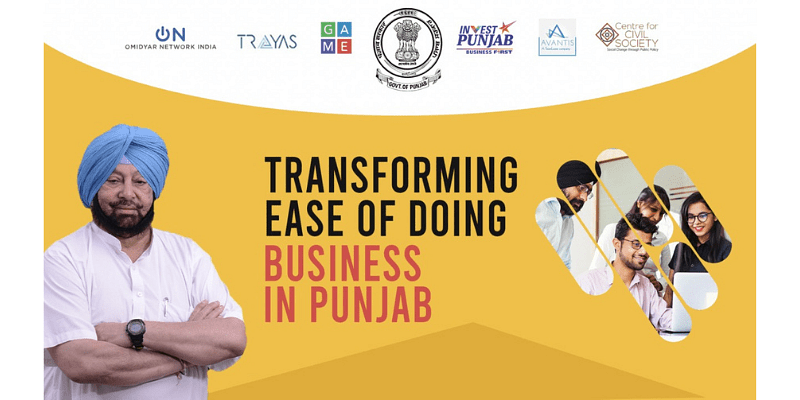At 2 lakh+ Micro, Small and Medium Enterprises (MSMEs), the sector forms the backbone of manufacturing in Punjab, and has witnessed focussed efforts from the state government in promoting its growth.. For instance, last year, the state passed the Punjab Right to Business Act 2020. The Act aims to enable ease of doing business (EoDB) for the newly-incorporated MSMEs through an enabling ecosystem for self-declaration, exemptions, speedier approvals, and inspections to establish and operate in the state. In addition, it has also implemented reforms such as removing imprisonment terms, building flexibility and reducing oversight in labour rules, and pursuing a data-driven assessment of service delivery delays. These efforts are aimed towards facilitating a seamless regulatory environment for MSMEs and thereby making entrepreneurship easier in Punjab.
Working with the ecosystem to fuel change
The state government has also been working closely with the private sector and ecosystem stakeholders on impactful projects to bring systematic changes in governance. Over the last few months, the Govt of Punjab, in partnership with Global Alliance for Mass Entrepreneurship (GAME), and allied partners, have been working together to make ease of doing business a lived reality for MSMEs. A slew of reforms have been launched in partnership with GAME and Omidyar Network India based on data-informed regulatory changes. The reforms were suggested by the GAME EoDB Task Force’s report titled ‘Transforming EoDB for MSMEs in Punjab’. The Task Force was set up on the recommendation of the Montek Ahluwalia committee, set up by the state government to revive business in the aftermath of the COVID-19 pandemic. The other key ecosystem partners of the initiative included Omidyar Network India, Trayas Foundation, Avantis RegTech, and Center for Civil Society.
On a path towards bringing regulatory reforms recommended by the industry
As a part of the state government’s continued efforts for MSMEs, Punjab Chief Minister Captain Amarinder Singh, on thursday, announced further reforms to reduce the regulatory burden on MSMEs through rationalisation, digitalisation and decriminalisation of the regulatory landscape. “Punjabis are risk takers and entrepreneurial by nature. The state of Punjab is known for its unique business friendly ecosystem that promotes entrepreneurship. The evidence lies in the form of investment of about Rs 80,000 Crores with a proposed employment of three lakh individuals in last four years from countries such as France, South Korea, Denmark, UAE, Japan, USA, Singapore, German France, South Korea, Denmark, UAE, Japan, USA, Singapore, Germany and UK,” the chief minister said.
Terming the reforms the beginning of the state’s transformation journey, he further said that with these reforms, commitments had been set for future changes, including rationalising trade licenses with the Shops & Establishments Act and removing imprisonment terms from 100 low risk provisions in non-labour related rules. Some of the reforms include reducing the number of labour registers that entrepreneurs are required to maintain from 60 to less than 14, removing discretionary powers of inspectors with regard to deductions related to absence or leave, a proposal to reduce the number of pre-commissioning licenses & NOCs to start a business by at least 20 percent, among others. He reiterated the state government’s commitment towards reducing the time, risk, and cost associated with compliance significantly and thereby enabling entrepreneurs to focus on growth. “These reforms are the start of a journey, and we hope to make Punjab a lighthouse state for MSME growth support,” he said.
The role of the ecosystem in bringing change
The announcement was made at an online event, which was also attended by government and industry stakeholders. The event saw leaders sharing more details about the initiative. Alok Shekhar, Principal Secretary, Department of Industries & Commerce, Government of Punjab said that this journey of making ease of doing business a reality for MSMEs began when the state government signed an MoU with GAME in October 2020. “We are now at the culmination of the first stage of a multistakeholder effort,” he said, adding that the recommendations would be implemented in collaboration with concerned administrative departments and completed by June 2021.Apart from the collaboration, he also highlighted the many initiatives that the Government of Punjab has undertaken in the last few months to improve ease of doing business including the expansion of the Invest Punjab portal to include 120+ state level regulatory approvals across 16+ government departments on a single portal.
Delving deeper into the collaboration between GAME and the Government of Punjab, Ravi Venkatesan, Founder, GAME, noted that GAME has been closely working with the state government on three key initiatives. The first, an accelerator programme for MSMEs.The second, an initiative focused on enabling access to credit for MSMEs through collaborations with banks, NBFCs and tech platforms, and the third to bring systematic changes to enable ease of doing businesses for MSMEs. “We are excited about all our work in Punjab and grateful for the support that we have received here. What we want to see is a mass flourishing of Punjabi enterprise and drive and to see the state become the lighthouse for the country ” he said.
Dr KP Krishnan, Former secretary, Government of India,who also headed the GAME EoDB Taskforce,spoke on the partnership between the ecosystem and the Government of Punjab.“The initiative symbolises the thought partnership between government and private sector of a completely different scale that is yet to be seen in any other state. It is a power packed multi stakeholder think and act coalition,” he said. “In addition to the multi-stakeholder partnership, the timely funding from the Omidyar Network was crucial in bringing flexibility, speed and long-term commitment for systematic transformation that the initiative focuses on.” He added that with the lockdown and the pandemic affecting the MSMEs, it was time for the state to intervene to do away with outdated regulations that hindered formalization and growth of MSMEs.
Present at the online convening, Vini Mahajan, Chief Secretary to the Government of Punjab and Principal Secretary, Department of Personnel and Vigilance, reiterated that the government’s efforts to enable ease of doing business is not just on paper, but reflected on the ground. “We are not just committed to implementing the reforms mandated by the Government of India but also also looking deeper into the factors that are affecting the growth of MSMEs in Punjab. While large industries often have access to government departments and senior policy makers, it is the MSMEs that actually have limited access; thereby calling for a need for institutionalised intervention,” she said.









